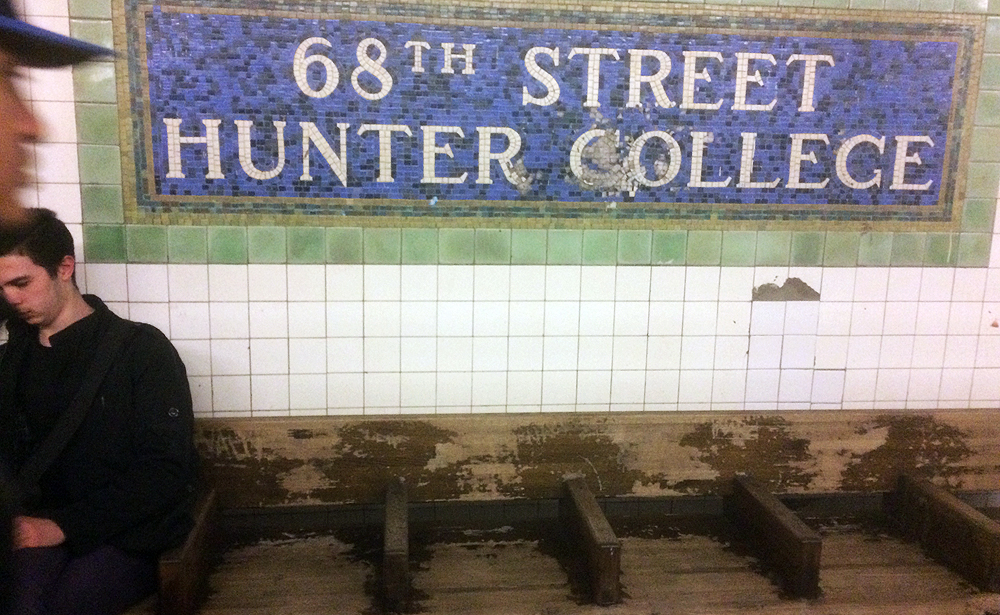 Article by Kay-Lee Ebanks, January 19, 2016
Article by Kay-Lee Ebanks, January 19, 2016
When Ricardo Montero-Hernandez, 11, and his mother immigrated to the United States in 2006, they had hoped to find a college that they could afford and that would also provide a good education.
Recalling that strategy in an interview, Montero-Hernandez, a fourth-year media studies major whose passion is journalism, described the steps that he has been taking to pursue a career in broadcast journalism. The 21 year old, who wore a red knitted sweater, a grey jacket, grey pants and red sneakers, cracked his knuckles while he spoke and said that he “wrote articles for whatever publication I could get published at.”
This resident of Harlem, at the time of the interview, had a paid news reporting internship at the CNN News Bureau in New York City. He also said that he wrote for a student-run newspaper, the Envoy, and for the faculty-supervised the WORD, and that he also anchored a news program for Hunter’s student-run WHCS radio and wrote scripts for the WHCS radio program, Hunter News at Noon. He also was a political analyst for a comedy show, “Everything Sucks.”
“Journalism should not be a career, it should be a passion,” he said, as he moved away from the escalators on the seventh floor of the West Building to avoid a crowd of students who were just leaving a lecture. Montero-Hernandez described himself as someone who takes “advantage of every opportunity” that he can. He said that he hoped to start his own online business that integrated journalism with multimedia.
Amina Talat, 24, also said that she hoped to pursue a career in journalism after graduating. “I want to be like Terrence J and interview celebrities, whether it’s in print or broadcasting,” said Talat. Terrence J co-hosts BET’s 106 & Park in 2006 and E! News as well as Giuliana Rancic in 2012, according to the BET official website. According to Wikipedia, he also is an American actor and television personality and model.
Talat, who was interviewed in the auditorium on the second floor of the North Building while she completed a class assignment, said that she was in the process of starting a new internship at the Wendy William’s Show as a TV studio production intern. She also said that she believed that journalism internships can open doors al though the Wendy William’s show, according to Wikipedia, is an syndicated infotainment talk show.
“I am taking the right journalism classes and I’m aiming to do more internships to help gain experience,” said the Bayonne resident who wore a long sleeved white sheer blouse, black jeans, and black boots at the time of her interview.
Talat, a senior, described the “right journalism classes” as the department-required introductory and production courses for all media studies majors with a journalism concentration. According to the website for the Department of Film and Media, the journalism concentration requires students to take nine credits in the introductory courses which includes Media 150 and 160, a prerequisite to all video production courses, and six credits in the required production courses which includes Reporting and Writing 1 and 2, both writing intensive classes.
Talat said that her biggest challenges as a student who wants a journalism career are “registering for classes” and “getting professors that genuinely care.” She described her ideal journalism professors as instructors who have real world experiences in journalism and are “knowledgeable.”
“Some professors are only here for a paycheck,” she said as her eyebrows furrowed and she fixed her gaze straight ahead. “I want a professor who assigns field work and edit our articles so that we can learn from our mistakes.”
Chello Cruz, 21, another media studies major whose focus is journalism, said he had a “passion for photo-journalism” and was only taking courses for the media studies degree because “it’s required.”
“I hope to graduate,” said senior, who wore a blue graphic T-shirt under a green jacket, black jeans, black vans, and a black fedora. “I didn’t really go to school to learn anything, I only went to get a degree.”
Cruz, who was interviewed in the outdoor seating area just outside of the library, said that he owns a photography business that focuses mainly on portraits and city life. He also said that the media studies major at Hunter should focus on active participation with up-to-date technology rather than theory.
“To be a great person in media, you have to have experience,” said Cruz.
Carlos Miller, a multimedia Miami journalist and creator of the news site Photography Is Not a Crime, and who graduated Florida International University with a degree in communications, said in an interview, “My goal was to become a writer for Rolling Stone Magazine, so I started writing for my high school newspaper, then wrote for my college newspaper.”
The photojournalist also said in the email interview that he was a “born writer and truth teller” so pursuing a career in journalism was a “natural choice.” He took journalism classes at Miami-Dade College and Florida International University. Miller also said that he interned at the South Dade News Leader, a small newspaper in Homestead, Florida.
“My college professors taught me how to be a better writer by learning how to tell stories rather than just compose a pile of information,” said the veteran journalist.
[Editor’s Note: “Becoming a Journalist” – Suggestions from the Society of Professional Journalists]
Kay-Lee Ebanks can be reached at Kay-lee.ebanks38@myhunter.cuny.edu